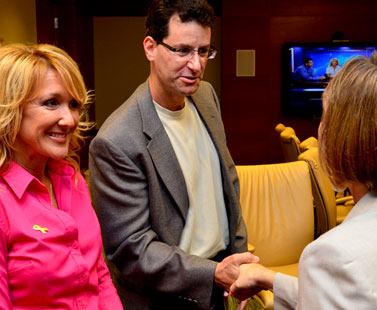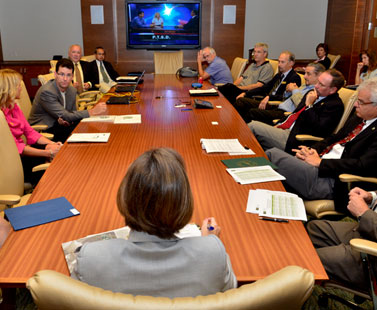Congresswoman Castor briefed on USF Health research projects

Dr. Carrie Elk, assistant professor and military liaison at the USF College of Nursing, and Dr. Kevin Kip, executive director of the College of Nursing Research Center, greet U.S. Rep. Kathy Castor of Tampa.
USF Health researchers recently updated U.S. Congresswoman Kathy Castor on a variety of research projects she helped get funded through Congress.
Dr. Kevin Kip and Dr. Carrie Elk from the USF College of Nursing briefed Castor during her June 9 visit to campus about a study testing the effectiveness of Accelerated Resolution Therapy, or ART, among veterans with Post Traumatic Stress Disorder (PTSD). It’s one of five RESTORE LIVES studies, totaling $2.1 million, aimed at helping soldiers from Iraq and Afghanistan overcome psychological trauma and other health problems that come from serving in combat operations. The other studies include web-based therapies for veterans with PTSD and mild traumatic brain injury, an investigation of the extent of PTSD and high-risk behaviors associated with the condition, and a study of how women veterans cope with stress, anxiety and other symptoms of PTSD.

Castor was briefed by USF Health faculty on various research projects funded by Congress that she helped sponsor.
ART is a therapy for post-traumatic stress disorder that integrates one-on-one therapy and back-and-forth eye movements, similar to those experienced in REM sleep, to help people replace disturbing images from a life-threatening experience with something positive. It can be completed in considerably less time than traditional cognitive behavior therapy.
Dr. Kip, epidemiologist and principal investigator for RESTORE LIVES, said the College expects to begin enrolling veterans in the ART study in early August. The researchers have already treated some civilians using the novel approach. “We think this therapy has great promise, but the data need to bear that out,” he said.

Other projects presented to Castor by the USF researchers included:
• Translational research related to battlefield injuries, including studies assessing how umbilical cord blood cells and GCSF, a growth factor that mobilizes stem cells, may help treat traumatic brain injury. Presented by Dr. Paul Sanberg, USF senior associate vice president for research and innovation and director of the USF Center of Excellence for Aging and Brain Repair
• Health informatics research tied to USF Health’s PaperFree Florida initiative to bring electronic prescribing to physicians in 11 counties across Florida. The project includes a piece with James A. Haley Veterans’ Hospital to develop the interoperability of electronic health records. Presented by Dr. Jay Wolfson, distinguished service professor of public health and medicine and USF associate vice president for law, health policy and safety.
• Countermeasures to combat protozoan parasites, toxoplasmosis and malaria, including using genetic tools to identify new treatment targets and advanced technologies to more effectively screen potential drug candidates. Presented by Dr. Tom Unnasch, professor of global health and co-director of the USF Center for Biological Defense; Dr. John Adams, professor of global health; and Dr. Robert Deschenes, chair of the Department of Molecular Medicine, USF College of Medicine.

Dr. Paul Sanberg, USF senior associate vice president for research and innovation, welcomes Castor.

Dr. Tom Unnasch, co-director of the federally-funded USF Center for Biological Defense, spoke about the center’s initiatives to guard against emerging global infectious diseases.

Dr. Robert Deschenes, professor and chair of molecular medicine, touched on collaborative toxoplasmosis and malaria-related research at USF Health.
Story by Anne DeLotto Baier, and photos by Eric Younghans, USF Health Communications

